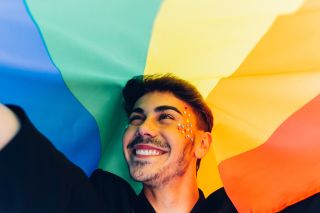Sexual Orientation
Accessing Queer Joy
Queer joy is not a destination, but it's a great defense against hate.
Posted May 14, 2024 Reviewed by Gary Drevitch
Key points
- Homophobia, biphobia and transphobia are rife, even in countries deemed as "liberal."
- Thriving is not just for "self-actualisation," but is a great defence against hate.
- Queer Joy is the joy of radical self-acceptance and embracing Queerness as part of one's core self.

May 17 is International Day Against Homophobia, Biphobia, and Transphobia (IDAHOBIT). It is a day to remind ourselves that hate towards LGBTQ+ people is still a major problem in the world. Despite many countries changing their laws to protect LGBTQ+ people, there are currently 64 countries that criminalize same-sex activities—29 of which are Commonwealth jurisdictions—and 12 countries impose the death penalty for same-sex intimacy, according to the Human Dignity Trust (data correct on 05/13/24).
Homophobia, biphobia, and transphobia in the UK
Even in a country deemed “liberal” like the UK, homophobia, biphobia, and transphobia are rife. It is easy for people who live with the privilege of cisgender heterosexuality to ignore the amount of hate that still exists in our streets or to minimize it (i.e., Why do they need Pride? They have equal rights now). Most heterosexual people in the UK can hold their partner’s hands anywhere without even thinking about it, whereas the same simple gesture from LGBTQ+ people can provoke an attack.
Indeed, violence against LGBTQ+ people is still common. The UK is particularly hostile to Trans people at the moment. India Willoughby, the world’s first Trans newsreader, posted a statement on X describing the reality of being Transgender today: “I’m so envious of those who don’t live in this permanent state of being under attack every single day from multiple fronts. Trans people just want to be themselves. Have a normal, mundane life. We’re not mentally impaired, we are not ‘invading’ or ‘stealing.'" (@IndiaWilloughby, X, 10/04/2024)
Picking a sunny holiday destination may be a “First World problem”, but the “problem” has different consequences for LGBTQ+ people compared to their heterosexual counterparts. For example, LGBTQ+ people have to pay particular attention to a country's laws before travelling, because there are numerous countries in which they could be imprisoned, or even killed, just for being who they are. On the other hand, heterosexual people don’t need to think about that because the entire world welcomes them. Most of the issues that LGBTQ+ people have to consider for their safety are invisible to most heterosexual individuals.
The awareness of ongoing homophobia, biphobia, and transphobia must not only occur on one day of the year for IDAHOBIT, but the actual day is an opportunity to get together—LGBTQ+ people and their allies—to collectively speak up on changing the global oppression of LGBTQ+ people, and instead, inviting the world to embrace the huge diversity in sexual orientations and gender identities.
It is important to amplify the voices of marginalised people because they are often shamed or threatened into silence. It is important to shine a light on oppressive systems ruling our societies that harm people—patriarchy, misogyny, racism, homophobia, biphobia, transphobia, ableism, ageism, classism, to name just a few—and to speak up for those who don’t have the same safe options in life. Many LGBTQ+ people find themselves in multiple intersections of “minorities”, and the more intersections there are, the harder it is to feel safe. On IDAHOBIT, we can challenge divisions and think about togetherness.
The Progress Flag and Family of Choice
The Progress flag is an important symbol and a beacon of hope (as I wrote with Robert Conner in this post). It is particularly important in a world full of hate that LGBTQ+ people can find some places of psychological and physical safety. The Progress flag is a symbol love and togetherness, helping LGBTQ+ people find a safe “family of choice”.
It is within those safe Queer spaces that LGBTQ+ people can take a respite from the unhospitable world and help each other with not only surviving but thriving. Often, we think that thriving is for people who feel safe all the time, when we have reached the top of the Maslow’s hierarchy of needs. In that case, what hope for thriving do LGBTQ+ people have? There is no chance they can “self-actualise” if they have to worry about threats just for being who they are. I would argue that thriving is not reserved for “self-actualisation” but is a great defence against homophobia, biphobia and transphobia.
Accessing Queer Joy
Thriving means different things to different people. It is important to find what it means for you. For example, it can mean embracing your sexual orientation and your sexual pleasure unapologetically and without shame. Or it can mean having a meaningful hug with your partner (or friend). Or perhaps it is laughing with your best friend. Or it can be a combination of all of those, and more. When LGBTQ+ people help each other with thriving in safe Queer spaces, they can access Queer Joy—the joy of radical self-acceptance and embracing Queerness as part of one's core self. It is not easy when so many societal and cultural influences tell LGBTQ+ people they are undesirable. Queer Joy requires work, and it comes and goes, like all other emotions. Accessing Queer Joy means challenging those daily niggling negative thoughts about ourselves. It means making choices based on good self-worth. It involves stopping competing with each other and rejecting each other, and lifting each other up instead.
Even though LGBTQ+ people experience the painful and wounding effects of homophobia, biphobia and transphobia, they have the superpower of togetherness, thriving, their “family of choice”, and Queer Joy. Let’s continue to plug into that co-created abundant Queer energy, as part of our basic needs, all the way to self-actualising.




